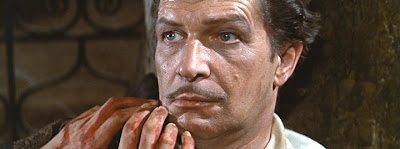 A few more, as promised:
A few more, as promised:Nightmare City is one of the many cheap Italian-produced zombie movies made after the major success of Romero's Dawn of the Dead. The first of these spawn was Lucio Fulci's Zombie, which is okay but something of a letdown; Zombie's trailer promises a zombie meltdown in New York City but then the actual movie mostly takes place on a rural Caribbean Island. Nightmare City fulfills that promise and takes place in a modern, unnamed Western city. Technically they aren't 'zombies' but rather victims of 'nuclear contamination' which has destroyed mens' brains, given them a thirst for blood, and caked brown gunk on their faces. Like so many Italian horror movies from the 1970s and '80s, it's a movie that privileges action and spectacle over coherence and narrative sense, which means that things happen for no reason, like the existence of a TV dance show so that women can be chased around in their leotards and attacked by zombies. It's fun in a cheesy, grindhouse kind of way.
 I had seen The Innocents once before but it seemed like a good idea to revisit it again when I found out that Deborah Kerr had died. It's a handsome movie, well-acted by Kerr and well-shot by cinematographer Freddie Francis, and a pretty good adaptation of James' The Turn of the Screw. However, I question the approach taken here in adapting the story's ambiguities. The movie feels like it's trying very hard to be superior to the character of Kerr's Miss Giddens, condescending to her sexual repression and hysteria. And that's why I think this movie is ultimately inferior to its next-door-neighbor, Robert Wise's The Haunting, which is about many of the same things but remains closer and more emotionally connected to its main character, Eleanor, and her problems, and more willing to indulge in the pure pleasures of the horror movie, with the bulging doors and creaks and jolts and so on. The Innocents, in trying to be so purely psychological and tasteful and genteel, falls a little short for me. Kerr is great, though.
I had seen The Innocents once before but it seemed like a good idea to revisit it again when I found out that Deborah Kerr had died. It's a handsome movie, well-acted by Kerr and well-shot by cinematographer Freddie Francis, and a pretty good adaptation of James' The Turn of the Screw. However, I question the approach taken here in adapting the story's ambiguities. The movie feels like it's trying very hard to be superior to the character of Kerr's Miss Giddens, condescending to her sexual repression and hysteria. And that's why I think this movie is ultimately inferior to its next-door-neighbor, Robert Wise's The Haunting, which is about many of the same things but remains closer and more emotionally connected to its main character, Eleanor, and her problems, and more willing to indulge in the pure pleasures of the horror movie, with the bulging doors and creaks and jolts and so on. The Innocents, in trying to be so purely psychological and tasteful and genteel, falls a little short for me. Kerr is great, though. Like everyone, I've seen The Silence of the Lambs a bunch of times and it's become an influential, landmark film. The weird thing about it is that it really straddles the line between the highbrow and the low-brow - I don't know of any other Academy Award-winning movies that include a character escaping from the police by disguising himself under a dead man's face - and then forty-five minutes later, we're laughing that he's about to murder and eat a guy.
Like everyone, I've seen The Silence of the Lambs a bunch of times and it's become an influential, landmark film. The weird thing about it is that it really straddles the line between the highbrow and the low-brow - I don't know of any other Academy Award-winning movies that include a character escaping from the police by disguising himself under a dead man's face - and then forty-five minutes later, we're laughing that he's about to murder and eat a guy. The movie exists on two different planes - there's the sensitive, emotional half of the movie that focusses on Clarice Starling, her childhood traumas, and her efforts to try and get by in a male-dominated society, coupled with Brooke Adams as the victim down in the bottom of the well. Then there's the half of the movie where you have a superhuman, hyper-intelligent bad guy named Hannibal Lecter who the audience falls for. Demme sews these elements together pretty seamlessly, but when you really get down to it, Hannibal Lecter, the serial killer who's smarter and more cultured than you are and therefore transcends the category of mere murderer doesn't really belong in a movie that purports to be a real, psychological portrait of authentic serial-killers and victims. He's a sophisticated, archetypal cartoon character, which Ridley Scott realized when he made Hannibal and reconfigured that movie into an over-the-top fairy tale.
There's no way to verify this, but I have a pretty strong feeling that Jonathan Demme was embarrassed by having created the biggest horror icon since Freddy Krueger, and took pains to only make serious-minded liberal movies and documentaries for the rest of the 1990s.
More to come soon.











































